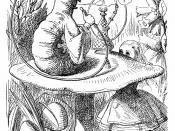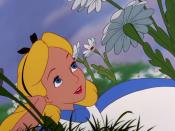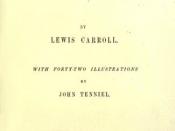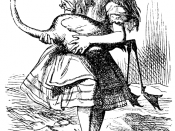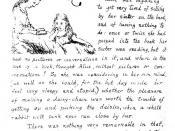Occasionally, we all feel lost and do not know how to get back to where we think we belong. Alice, of Alice in Wonderland felt this way when she woke up in a new world that was full of surprises and strange creatures. The question that arises from this is are we, as humans, so accustomed to our lives' that change is virtually impossible? Everyday, people are depressed and upset about so many things. Can we break down everyone's misery on this earth into one category? This category being that out of our element, and our regular surroundings, we cannot function properly. According to Eastern thought, such as Buddha, we cannot find happiness in material things or even our own surroundings. We find happiness in ourselves no matter where we are or what possessions we have. For example, Alice's new world is strange to her but completely normal to the people in that are living in this world because it is what they are accustomed to everyday.
The strange creatures of Alice's new world are content with the world they live in and it is normal for a caterpillar to talk and a queen to represent a deck of cards. Lewis Carroll, author of Alice's Adventures in Wonderland, writes about how changing the environment of Alice was a challenge at first but being the strong young lady she was, she adapted and eventually overcame all of the problems and predicaments she faced in the new world.
"Come, there's no use in crying like that!" Alice speaks to herself like that because she knows that in order to get back to her reality, she must conquer her fear, which is being out of her reality. Alice does not follow the advice she tends to give herself throughout the story, as she continues to cry repeatedly while in this new world. Alice enjoyed being pretending to be two people. She, just as any other human, has a tendency to act like a different person in different situations. In this new world Alice found herself having a hard time just being Alice. It is a normal part of life to act differently in different situations. Alice is not going to act the same around someone she knows compared to the mad hatter or the talking rabbit to whom she has just met. As humans we automatically put our guard up and do not let a person see the real us at first. Another natural reaction is the expectation and anticipation for something to happen. For example, when Alice ate the cake she figured that something was going to happen. When nothing happened after she ate the cake she was almost disappointed because once again, she had grown accustomed to a regular thing happening and when it did not, her reality was thrown off and she had to ask herself whether or not this was her reality.
When Siddhartha Gautama, or Buddha went to try to find enlightenment, which according to Buddha, can only be achieved when we see things the way that they truly are. Maybe Alice had to look at life in this new world to achieve some kind of enlightenment. Alice might have been in a state of denial with her life and needed to change her views on ways that she thought such as first impressions. Alice sees a cake and automatically assumes that something strange is going to happen. Buddha says that we cannot be truly enlightened until we do not expect anything to happen. Figuring is a very dangerous part of life, and Buddha wanted to never figure that anything was going to happen because he knew that we are not supposed to know what is going to happen. Alice soon learned that one should never expect anything in life when she all of a sudden grew to be about nine feet tall.
Now that Alice is so tall she has the problem of overcoming the adversity and working with the height so it will possibly benefit her. She has no option other than to ask help from the rabbit that is quickly running around in a panic. Buddha would not agree with her choice to seek help from an outside party. Buddha believes that we cannot count on others for our benefit. The reality of Alice at this point needs to be recognized as the truth so that she can overcome this problem. As long as she stays in denial and does not realize that she is the only one that can fix her problem, she will stay with a feeling of hopelessness. Alice is now having trouble identifying who she really is. "But if I am not the same, the next question is, than who in the world am I?" This question cannot be answered through thoughts of hopelessness. Buddha would recommend that Alice recognize the truth because she will never know the answer to her question if she does not accept responsibility for this problem and stays in a state of denial.
When faced with a problem such as Alice's, we naturally try to blame it on everything and anything we can. Alice blames her dilemma on becoming a different person and tries to compare herself to people she knows according to their intelligence and appearance. Alice then goes into a discussion about being that other person and liking yourself. She says that if she likes how she is, she will go back to her normal life. If Alice does not like how she is than she will stay where she is and not try to change what has happened. This is a problem that Buddha was trying to stop. Buddha saw that the world was full of people who "chickened" out when put on the spot or faced with any particular problem. Buddha created a system of belief that if a person can recognize the truth of their situation, such as Alice in her difficult one, they will be enlightened and end their suffering.
As we look back on Alice's journeys through height and the different predicaments she got herself into, we see that her story represents how we all feel sometimes. We all feel lost, like Alice did in this new world. We all feel hopeless, like Alice did when she could not get the key to the door. We all feel a sense of accomplishment, like Alice did when she realized that she was no longer nine feet tall. What Buddha thinks we should do is lose all of those worthless feelings because it does not help us to gain the truth. All of these feelings are like hurdles, and each one represents a false feeling which only holds us back from knowing the truth and putting the materialistic nature that we are born with behind us. As I look back on how I once viewed Alice and Wonderland, and just see a girl who had a dream, I now see a deep tale that represents almost all aspects of the struggles and suffering of everyday life and all of the times one really is thrown out of their element and forced to adapt to this foreign way of life that makes no sense. The thoughts of Buddha and the way Alice solved her problems crashed head-to-head; but if we take a little bit of an example from how Alice handled things in Wonderland and mix it up with a little Buddhist thought, I think that we could have almost the perfect combination to tackle any problem in a civilized and productive manner.
